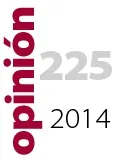Why does Putin fear Maidan?

Carmen Claudín
Senior Research Fellow, CIDOB
February 26, 2014 / Opinión CIDOB, n.º 225/ E-ISSN 2014-0843
This article was published in El País on 23 February 2014 and in openDemocracy on 24 February. It is translated from Spanish by Julie Wark, and republished by kind permission.
The author and translator dedicate this text to Fred Halliday (1946-2010), CIDOB affiliate and openDemocracy columnist.
Maidan marks a milestone for all of Europe. Although Yanukovych has fled and now denounces a coup d’état, the fact remains that a regime which lost legitimacy long ago has been ousted as a result of mass protest. The bloodshed has at last stopped but what comes next will certainly not be easy. First of all for Ukraine, a country teetering on the edge of bankruptcy, with serious internal divisions, an opposition lacking cohesion and without strong leadership, not to mention a post-Soviet political culture which raises major obstacles to establishing rule of law. Then, for the European Union, which has now acquired towards Ukraine a responsibility that was certainly not on the agenda, for all Russia’s claims to the contrary.
For President Putin, the prospect of losing Ukraine for the Eurasian Union is a torpedo hit for his project of reconstructing a zone of structured influence in post-Soviet space. Worse still, a democratic Ukraine would be a denial of Putinism: it would demonstrate that there is no such thing as an East Slavic specialness that endows with legitimacy a model of democracy specific to Russia.
Moscow has clung to two main lines of argument to denounce the resistance in Ukraine. The first points at the external factor, namely foreign interference (European Union and the United States), meaning that present events could not be the expression of any autonomous will of the people because someone else must be pulling the strings. The second, taking advantage of the political heterogeneity of Maidan, focuses on the internal one: the mass-based movement is led by radical fascists who are knocking at our door. The great majority of the Russian media outlets, especially television, have picked up and broadcast this message with propagandistic overtones that bring back memories of Soviet times. It is now also being repeated by a very rattled Yanukovych.
Putin is berating “westerners”, a timeworn practice in Moscow. He and his close circle have indeed kept a low profile since January and they can assert, unlike senior US and EU officials, that they have not been frequenting Kiev. This simply overlooks the fact that as long as Yanukovych remained in power, they did not need to budge. A phone call was enough. They have indignantly denounced the threat of sanctions by Brussels and Washington as proof of their interference even though at the end of 2013 Russia – preventively – applied a long list of harsh trade sanctions in an attempt to dissuade the Ukrainian government from signing the EU-Ukraine Association Agreement. Now, the share of Russian pressure in Yanukovych’s complete capitulation is undoubtedly the result of Moscow’s preference for tactical retreat in order not to lose out with its greater objective.
Few people could have imagined that the degree of determination and capacity for sacrifice shown by the Ukrainian citizens who have come out into the streets would put the government up against the ropes and oblige it to accept all their conditions. Least of all the Kremlin because people simply do not enter into its notion of power.